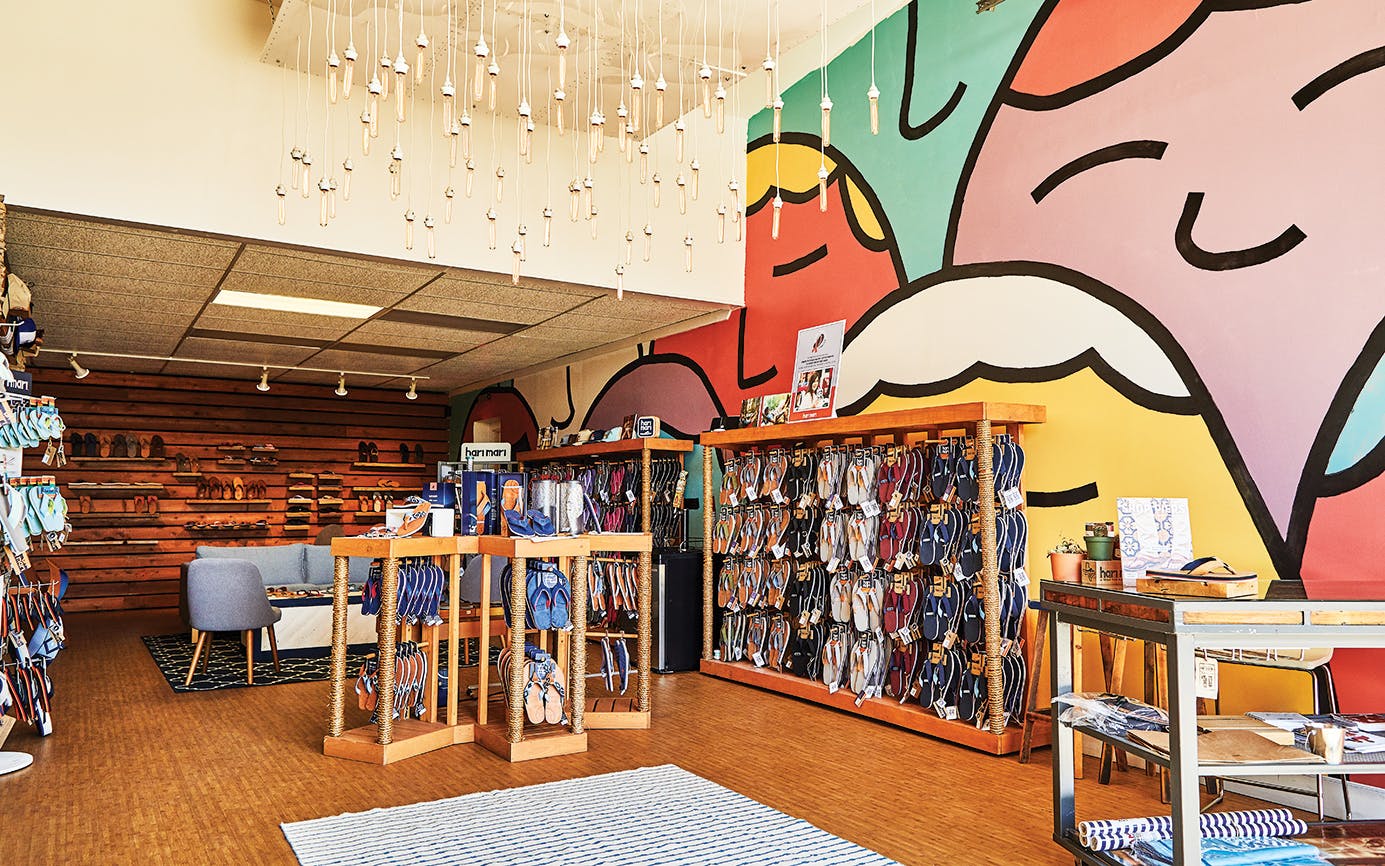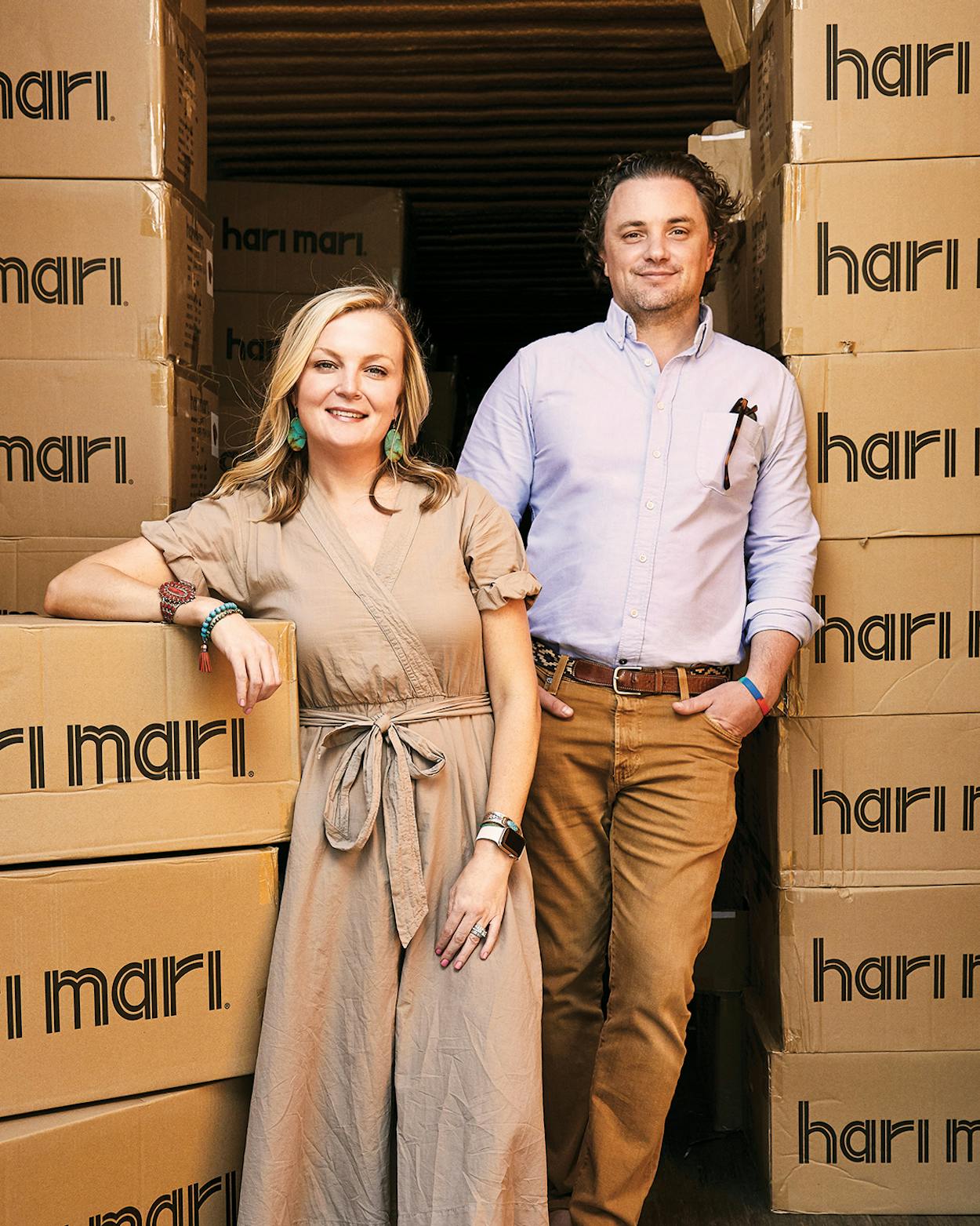Consider the flip-flop. As ubiquitous in Texas as the cowboy boot, it is, unlike the cowboy boot, not much of a canvas for flaunting one’s style. There isn’t a lot to the humble flip-flop. It exposes the foot and offers little in the way of support for the sole. Its primary structural element is a tiny piece of material that jams between the big toe and second toe. Often made from cheap rubber, a pair of flops can wear out after a single season. But Lila and Jeremy Stewart saw opportunity where others saw disposability. It was time, they decided, for the flip-flop to get an upgrade.
The Stewarts, Dallas natives who met on a blind date, are the founders of Hari Mari, the only major flip-flop company based in Texas. Launched in 2012, the brand is now available through hundreds of retailers across the country, including Nordstrom, Neiman Marcus, and Zappos. Earlier this summer, J.Crew started selling a handful of Hari Mari designs as part of the retailer’s “Brands We Love” program. That’s just the latest high-profile partnership for Hari Mari. A collaboration with menswear designer Peter Millar debuted last year, and one with baseball-glove maker Nokona the year before. Hari Mari won the 2018 Flip Flop of the Year Award from Flip Flop Daily, a website dedicated to the “flip-flop life.” (Yes, that’s an actual award and an actual website—perhaps not so surprising when you consider the annual U.S. market for this shoe category is nearly $3 billion.)
The Hari Mari story starts in 2007—in Indonesia, of all places. After pursuing an MBA at the University of Texas at Austin, Jeremy was offered a job with a political advertising firm in Jakarta, and the couple seized the opportunity for adventure. While there, they got married and became immersed in the local culture. Lila, who had left a job in Texas working for a large concert promoter, volunteered with the American Women’s Association of Indonesia (an organization of expats focused on social welfare), mainly spending time in orphanages. The experience had a profound impact on the couple, and when they returned to the States, in 2009, they decided to follow the lead of companies like Toms shoes and Warby Parker eyeglasses that had built powerful brands in recent years by supporting social missions. The Stewarts didn’t yet know what they’d sell, but they wanted to start a business that would donate some of its proceeds to helping kids. They chose to help support patients who were battling pediatric cancer, which kills more American children than any other disease.
In Jakarta’s tropical climate, flip-flops had become the Stewarts’ default footwear, and they’d worn out pair after cheap pair. Shopping for yet more replacements once they were back in Dallas, they had the realization that would lead to Hari Mari. Everything they saw was black and brown and boring, and it all looked the same as it had before they’d left the country a few years earlier. Jeremy had a light-bulb moment: there was room in the market for a premium flip-flop brand built around comfort and color.

Thus began two years of R&D. Despite the flip-flop’s simplicity, building a better one was no simple matter. The couple bought flip-flops in stores all across Dallas and cut them apart to figure out how they were made. Jeremy sketched designs. Their products would have arch support; soles made of 100 percent natural rubber (not synthetic); a range of colors; and fine leathers or durable nylon for the straps. The biggest design challenge was the dreaded toe piece, which has rubbed many a big toe raw and is known to pop out of the sole. The solution: memory foam, encased in a tubular soft-nylon sheath firmly anchored to the shoe’s base. The Hari Mari MemoryFoam Toe, as they named the invention, was granted a U.S. patent in late 2018. (Their explanation of the brand name: “hari” is the Indonesian word for “of the sun,” and “mari” means “of the sea” in Latin.)
In late 2011, with their new sandal design dialed in, the couple placed an order for 25,000 pairs from a footwear factory in China, even though they had yet to line up customers or retailers. They rented a warehouse and office space in the Design District, built an e-commerce site, and, in March of the next year, packed up Lila’s car with samples; she hit the road for the better part of six months to pitch stores across Texas and the Southeast.
Notably, she did not head west. “People would say I was crazy not to go California, where every major U.S. flip-flop brand, including Reef, Rainbow, and Quiksilver, is based,” she says. (Havaianas, the global market leader, is headquartered in Brazil.) But the established brands, she felt, all relied on a narrow, surfing-inspired aesthetic. She wanted to create a lifestyle brand, not a beach one. “Maybe back in the seventies and eighties, when the surf culture took off, that aesthetic made sense. But today people wear flip-flops all the time, sometimes to work, sometimes out at night—almost everywhere now.” When she finally got back to Dallas, she had made deals with some fifty stores.
The company now offers nine lines of sandals for men, nine for women, and four for kids. Hari Maris cost a lot more than your typical flip-flops, starting at $50 for its nylon-strapped water-friendly versions, hitting $60 to $75 for most of its leather ones, and topping out at $125 for its collaborations with Peter Millar and Nokona. But the potential for sticker shock hasn’t stopped sales from doubling in the past year alone, according to Jeremy. One percent of every purchase goes toward treatment costs for children fighting cancer at Cook Children’s Medical Center, in Fort Worth, as well as a rotating group of other medical institutions. Early this year, Hari Mari expanded its vision beyond flip-flops, launching chukka boots and vintage-inspired running shoes for men; a women’s shoe line will come in 2021.
Lila and Jeremy, who now have two little girls, are committed to their hometown. They’ve moved their warehouse and office, which now includes a Hari Mari store, to Deep Ellum. Lila still remembers the raised eyebrows she and Jeremy got when they were pitching local investors: “We’re the only flip-flop company in Texas, so we’re an anomaly regardless, but especially in Dallas,” a city known more for dressing up than down. But then again, Hari Maris are not your average flip-flops. Lila wears them every day. “I can’t wear high heels anymore,” she says.
This article originally appeared in the September 2019 issue of Texas Monthly with the headline “How the Flip-flop Got Fancy.” Subscribe today.
- More About:
- Style & Design
- Dallas









